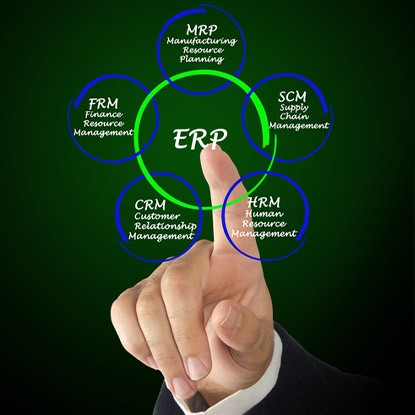ERP Software:
Business Processes Optimization


Discover the world of ERP software and its transformative impact on business processes. From centralized data management to real-time analytics, our article explains the strategies and insights that define the journey of organizations towards operational excellence.
In the ever-evolving landscape of business, efficiency reigns supreme. But how do you navigate the intricate dance of interconnected processes to ensure your company waltzes gracefully towards success? Enter the knight in shining armor: Enterprise Resource Planning (ERP) software. This article demystifies the wonders of ERP, unveiling its power to optimize workflows, boost productivity, and unlock the full potential of your business.
Revolutionize Your Business Operations!
Elevate your business to new heights by integrating Artsyl’s cutting-edge intelligent process automation platform docAlpha with your ERP software. Bring an end to manual processes and embrace an era of efficiency and innovation. Transform the way you work – integrate and thrive!
Book a demo now
Think of your business as a complex orchestra, where every department – finance, sales, manufacturing, inventory – plays a crucial role. But without a skilled conductor, the music can easily turn into cacophony. This is where Enterprise Resource Planning (ERP) software enters the stage, transforming into your digital maestro, seamlessly harmonizing operations for an efficient and profitable performance. Here’s how ERP achieves this:
Remember, ERP is not just a software solution; it’s a philosophy of integrated efficiency. It’s about removing friction, automating repetitive tasks, and empowering your team with data-driven insights. With ERP as your conductor, your business can transform into a well-oiled orchestra, delivering a harmonious and profitable performance.
Unleash Efficiency, Embrace Excellence!
Ready to boost productivity and streamline your operations? Integrate Artsyl InvoiceAction seamlessly into your ERP software. Harness the combined power of advanced automation and ERP prowess. Explore the potential of ERP software integration today and unleash the hidden efficiency within your company!
Book a demo now
Enterprise Resource Planning (ERP) software plays a crucial role in optimizing business processes by streamlining operations, enhancing efficiency, and providing comprehensive insights. To begin with, ERP software consolidates data from various departments into a centralized database.
ERP systems act as a centralized repository for data from different departments such as finance, human resources, supply chain, and more. This ensures that all relevant information is stored in a single location.
In addition, ERP software breaks down data silos that can emerge when information is scattered across various systems or departments. This integration allows for a holistic view of organizational data, promoting better collaboration and decision-making.
Experience the Synergy of Innovation!
Witness the magic of integration as Artsyl OrderAction order data capture brings sales order automation with your ERP software. Elevate your workflow, eliminate bottlenecks, and experience a level of synergy that takes your business to new heights. It’s time to redefine efficiency – integrate now!
Book a demo now
Real-time data accessibility in the context of Enterprise Resource Planning (ERP) is a transformative capability that empowers users throughout the organization by providing instantaneous access to the most current and accurate information available.
This real-time accessibility serves as a catalyst for agile decision-making, fostering a dynamic and responsive operational environment.
In an ERP-driven system, data is continuously updated and synchronized across various modules, ensuring that every user, from executives to frontline employees, is equipped with the latest insights into critical business metrics.
The significance of real-time data accessibility becomes particularly pronounced in fast-paced industries or environments where conditions change rapidly. Whether it’s monitoring inventory levels, tracking sales performance, or assessing project milestones, ERP enables decision-makers to stay abreast of developments as they occur. This dynamic access to information ensures that strategic and tactical decisions can be made with a heightened level of precision and relevance.
ERP automates repetitive tasks and workflows, reducing manual intervention. This leads to increased operational efficiency as employees can focus on more strategic and value-added activities. Here’s how Enterprise Resource Planning (ERP) software plays a pivotal role in enhancing efficiency across various business processes:
ERP software automates routine and time-consuming tasks, reducing manual efforts. This automation streamlines processes such as data entry, order processing, and inventory management, freeing up time for employees to focus on more strategic activities.
ERP integrates data and processes across different departments. This integration ensures a seamless flow of information, preventing bottlenecks and delays caused by disjointed systems. The interconnected nature of ERP promotes collaboration and accelerates decision-making.

ERP systems often come with predefined workflows that align with best practices. By following standardized procedures, businesses can eliminate inefficiencies, reduce errors, and ensure consistency in their processes.
ERP fosters communication and collaboration among team members. Shared access to centralized data allows employees from different departments to collaborate effectively, promoting a more cohesive and agile work environment.
ERP contributes to improved customer service by providing a 360-degree view of customer interactions. Sales, service, and support teams can access customer data in real time, enabling them to respond promptly to inquiries, resolve issues, and enhance overall customer satisfaction.
ERP helps optimize inventory levels by providing accurate and real-time insights. Businesses can avoid overstocking or stockouts, reduce carrying costs, and enhance order fulfillment efficiency.
ERP streamlines financial processes, including accounting, budgeting, and financial reporting. Automated financial workflows ensure accuracy, compliance, and a faster financial close, contributing to overall operational efficiency.
RELATED: AP Automation Solutions that Leverage Artificial Intelligence
ERP software provides insights into resource utilization, enabling businesses to allocate resources more effectively. Whether it’s human resources, equipment, or materials, ERP software solutions help ensure that resources are utilized optimally to support business objectives.
As you can see, ERP software stands as a catalyst for efficiency improvement by automating processes, integrating information, and providing real-time insights. Its impact spans across the entire organization, fostering a more agile, collaborative, and effective operational environment.

Ready to revolutionize the way you work? Integrate Artsyl’s game-changing docAlpha with your ERP software. Experience a seamless flow of data, eliminate manual errors, and witness a transformation in your business workflows. Take the leap towards success – integrate and thrive!
Enterprise Resource Planning (ERP) software is versatile and applicable across various industries, streamlining business processes, enhancing efficiency, and providing a holistic view of operations. Here are use cases of ERP software in different industries:
In manufacturing, ERP optimizes production planning, inventory management, and supply chain operations. It ensures that materials are procured efficiently, production schedules are aligned with demand, and quality control processes are integrated.
Use Case:* In the retail sector, ERP manages inventory across multiple locations, synchronizes sales and purchase data, and aids in demand forecasting. It facilitates seamless integration between online and brick-and-mortar stores, ensuring a unified customer experience.
ERP software enhances healthcare management by integrating patient records, scheduling appointments, and managing medical inventory. It streamlines billing processes, ensuring accurate and timely invoicing while maintaining compliance with healthcare regulations.
In the finance industry, ERP software assists in financial planning, budgeting, and accounting. It automates financial workflows, consolidated financial data, and provides real-time insights for better decision-making by financial professionals.
ERP in construction facilitates project management, resource allocation, and procurement. It integrates data from construction sites, manages subcontractor relationships, and ensures timely project completion by optimizing workflows.
In the education sector, ERP software helps manage student information, academic planning, and administrative tasks. It streamlines admissions, enrollment, and course scheduling processes, providing a comprehensive platform for educational institutions.

In the hospitality industry, ERP aids in hotel management by integrating reservations, managing room inventory, and streamlining billing processes. It ensures efficient coordination between different departments, enhancing the overall guest experience.
ERP in the automotive industry optimizes supply chain management, production planning, and inventory control. It helps automotive companies manage complex manufacturing processes, coordinate with suppliers, and meet demand efficiently.
ERP in the pharmaceutical industry manages regulatory compliance, production scheduling, and quality control. It ensures traceability of ingredients, monitors batch processes, and helps maintain stringent compliance standards.
RELATED: Intelligent Process Automation for Shared Service Organizations
In the energy sector, ERP assists in managing complex projects, optimizing maintenance schedules, and coordinating resource allocation. It ensures compliance with environmental regulations and enhances overall operational efficiency.
ERP in telecommunications streamlines billing processes, manages customer relationships, and optimizes network infrastructure planning. It aids in inventory management of telecom equipment and facilitates efficient service delivery.
In each of these industries, ERP software serves as a unified platform that addresses specific challenges and optimizes processes for better operational efficiency and decision-making. The adaptability of ERP makes it a valuable asset across diverse business environments.
Artsyl Smart Solutions Meet Your ERP
Elevate your business to the next level by seamlessly integrating Artsyl InvoiceAction with your ERP software. Say goodbye to invoicing silos, welcome real-time insights, and empower your team with tools that redefine efficiency. Your journey to intelligent invoice management starts here!
Book a demo now
ERP is a software solution that integrates various business functions and processes into a unified system. It facilitates real-time data flow and enables organizations to streamline operations, enhance collaboration, and make informed decisions.
Modules are individual components or applications within an ERP system that focus on specific business functions. Common modules include finance, human resources, supply chain management, and customer relationship management.
Integration refers to the ability of ERP systems to connect and synchronize data and processes across different modules and departments. It ensures a seamless flow of information throughout the organization.
Customization involves tailoring the ERP system to meet specific organizational requirements. This can include modifying workflows, adding new fields, or adapting the user interface to align with unique business processes.
Implementation is the process of deploying and configuring the ERP software within an organization. It involves planning, data migration, training, and testing to ensure a successful transition to the new system.
Cloud ERP refers to ERP software that is hosted and delivered through cloud computing. It offers advantages such as scalability, accessibility from anywhere, and reduced infrastructure costs compared to on-premises solutions.
RELATED: ERP Integration: Cloud Invoice Management in ERP
Data migration is the process of transferring data from legacy systems to the new ERP system. It involves mapping data, cleaning, and validating to ensure accurate and complete information transfer.
These key terms provide a foundational understanding of the essential concepts associated with ERP software, laying the groundwork for successful ERP adoption and utilization within an organization.
Artsyl Integration: A Game-Changer
Ready to amplify the impact of your ERP? Integrate Artsy docAlpha for a holistic business transformation. Streamline processes, enhance accuracy, and unlock the full potential of your ERP investment. It’s time to go beyond – integrate for success!
Book a demo now
ERP software is like a Swiss army knife for your business, offering a multitude of modules to tackle different aspects of your operations. Here are some key modules that optimize business processes across various departments:
Remember, the specific modules your business needs will depend on its size, industry, and unique processes. Choose a solution that offers flexibility and scalability to adapt to your evolving needs.
By leveraging the power of these modules, ERP software can significantly optimize your business processes, leading to increased efficiency, productivity, and profitability.
In conclusion, ERP software serves as a comprehensive solution for optimizing business processes by integrating, automating, and improving various facets of operations. Its impact extends across the organization, fostering agility, competitiveness, and sustained growth. This article has illuminated the transformative potential of ERP software, painting a clear picture of its ability to streamline workflows, boost productivity, and empower your business for growth.

Remember, investing in ERP is not just about software – it’s about investing in your future. So, take the first step towards streamlined success, ditch the outdated systems, and embrace the power of an optimized business journey. The future is bright, and ERP is your compass.
Understanding key FAQ associated with Enterprise Resource Planning (ERP) software is crucial for anyone involved in the selection, implementation, or use of ERP systems.
ERP software is a comprehensive solution that integrates and manages various business processes and functions within an organization. It facilitates real-time data flow, collaboration, and informed decision-making across different departments.
ERP is essential for businesses as it streamlines operations, enhances efficiency, and provides a unified platform for managing critical processes. It improves data accuracy, supports decision-making, and promotes organizational agility.
Common ERP modules include Finance, Human Resources, Supply Chain Management, Customer Relationship Management (CRM), Manufacturing, and Inventory Management. The modules vary based on the specific needs of the organization.
ERP improves efficiency by automating repetitive tasks, integrating data across departments, providing real-time insights, and streamlining workflows. This leads to reduced manual efforts, improved collaboration, and faster decision-making.
No, ERP is suitable for businesses of all sizes. While larger enterprises often have more complex requirements, there are ERP solutions tailored for small and medium-sized businesses (SMBs) that offer scalability and affordability.
The implementation timeline for ERP varies based on factors like the size of the organization, customization requirements, and the complexity of processes. On average, ERP implementation can take several months to a year.
The cost of ERP software depends on factors like the vendor, the scope of customization, and the number of users. It typically includes licensing fees, implementation costs, and ongoing support fees. Costs can range from thousands to millions of dollars.

Common challenges during ERP implementation include data migration issues, resistance from employees, scope changes, and potential disruptions to business operations. Adequate planning and change management strategies can help address these challenges.
ERP supports business growth by providing a scalable platform that can adapt to increased data volumes and additional functionalities. It promotes efficiency, helps in resource optimization, and supports informed decision-making as the organization expands.
Cloud ERP offers advantages such as scalability, accessibility from anywhere, and reduced infrastructure costs. It allows businesses to access ERP functionality through the cloud, enabling flexibility and ease of management.